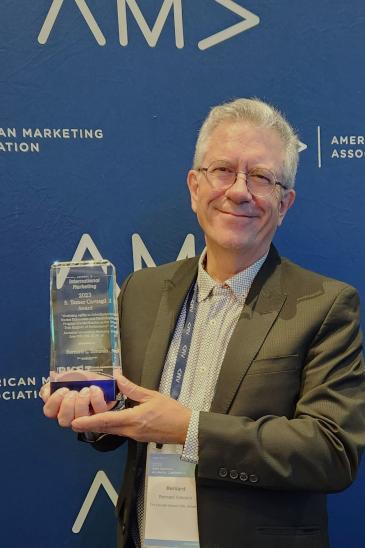-

Hear from Monica Toft, Academic Dean
Learn how Monica Toft, Academic Dean, is shaping the study of global affairs and diplomacy at Fletcher.
Hear from Prof. Toft -

Explore Fletcher academics in action
Fletcher Features offers insights, innovation, stories and expertise by scholars.
Get global insights -
Get application tips right from the source
Learn tips, tricks, and behind-the-scenes insights on applying to Fletcher from our admissions counselors.
Hear from Admissions -

Research that the world is talking about
Stay up to date on the latest research, innovation, and thought leadership from our newsroom.
Stay informed -
Meet Fletcherites and their stories
Get to know our vibrant community through news stories highlighting faculty, students, and alumni.
Meet Fletcherites -

Forge your future after Fletcher
Watch to see how Fletcher prepares global thinkers for success across industries.
See the impact -

Global insights and expertise, on demand.
Need a global affairs expert for a timely and insightful take? Fletcher faculty are available for media inquiries.
Get in Touch
American Marketing Association Awards Bernard Simonin
Fletcher Professor honored for contribution to the practice of international marketing

“Welcome to the marketing department,” Bernard Simonin tells visitors to his office in Mugar Hall. As Professor of Marketing and International Business, Simonin is Fletcher’s resident marketing sage, complementing the school’s interdisciplinary course offerings with classes on marketing management, marketing research, and strategies for non-profits.
Any department including Simonin is an accomplished one. The French-born professor has taught at universities in three continents and published papers in over a dozen of the world’s top academic business journals. Most recently, Simonin and two co-authors won the S. Tamer Cavusgil Award from the American Marketing Association. The award honors authors of a Journal of International Marketing article from the most recent calendar year that has made the most significant contribution to the advancement of the practice of international marketing management.
Simonin’s award-winning paper, co-authored with long-time colleague Ayşegül Özsomer, from Turkey’s Koç University, and technical expert Timo Mandler, from France’s TBS Business School, delves into a core question for global enterprises: to what extent should firms localize versus standardize their market strategies?
In today’s globalized marketplace, firms face risks in either direction. Locally-focused companies can be outcompeted by multinational giants, who benefit from international brand recognition and economies of scale. Globalized brands, meanwhile, can be outlocalized by companies with a better pulse of domestic market needs.
To demonstrate the dilemma, Simonin relays a quote from a Vice President at Unilever. “The main challenge of our business is to strike the perfect balance of optimizing global scale while being locally relevant to customers,” the executive says. “We don’t want to be hopelessly local or mindlessly global.”
Researching the issue, Simonin and his co-authors surveyed over 300 US and European-based multinational firms such as IBM and Procter & Gamble, examining their operations in both Japan and Turkey. Using market share and profitability as measures of performance, the team found that proper aggregation of the “twin engines” of standardization and localization could indeed explain a company’s success. Their paper coins the term “marketing agility,” describing a firm’s ability to correctly execute this balancing act.
For further insights, Simonin’s team interviewed 20 executives, including the CEO of Gap Inc., who validated these findings with his own experience. Gap struggled initially in Japan by applying a rigid global strategy; only after tailoring its approach to local sensibilities did it succeed in the Japanese market, a major prize for a fashion company.
The study also highlights the human element in marketing strategy. Global leaders must be attuned to local needs and sensibilities, while local managers need a broader perspective. Simonin advocates for programs that rotate local managers through headquarters to foster a diversity of viewpoints at the core of an organization’s operations. As a Colgate executive observed to Simonin, “Park Avenue can be an insular place.” Instead of separating domains, firms can leverage talent at their subsidiaries to bridge local and global perspectives.
Simonin’s findings are relevant lessons to Fletcher graduates entering a wide range of fields. Alongside practitioners of international business, those with careers in diplomacy, development, military service, or policy each benefit from balancing a global mindset with local awareness. The insights from this award-winning research are just one example of the valuable lessons Fletcher’s marketing courses offer to students across disciplines.
“At Fletcher, we talk about marketing for nations, cities, and causes,” Simonin says. “Marketing can be used for good or bad. Policymakers need marketing to understand how consumers make decisions and how people can be convinced to change behaviors. Learning these tools provides an advantage for all students at Fletcher, even those who may not think of themselves as business students.”
A Fletcher institution, Simonin has taught at the school for over 25 years, contributing his marketing expertise alongside Fletcher’s community of lawyers, economists, and historians. This diversity of thought, he believes, brings “wholeness” to addressing the complex challenges of our time. With insight into marketing, Fletcherites can stay agile, orienting to meet needs, win audiences, and transform their ideas into action.


